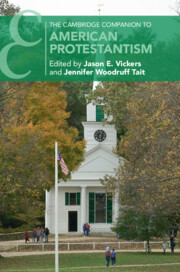Book contents
- The Cambridge Companion to American Protestantism
- Cambridge Companions to Religion
- The Cambridge Companion to American Protestantism
- Copyright page
- Dedication
- Contents
- Contributors
- Acknowledgments
- Introduction
- Part I Historical Overview
- Part II The Religious Culture of American Protestantism
- 5 Bible, Doctrine, and Theology
- 6 Worship and Preaching
- 7 Education
- 8 Work and Vocation
- 9 Politics and Government
- 10 Temperance
- 11 Gender, Sexuality, and Marriage
- 12 From Slavery to Black Lives Matter: American Protestants and Race
- 13 Faith Healing and Modern Medicine
- 14 Mental Illness
- 15 Protestant-Catholic Ecumenism and the Meanings of American Freedom
- 16 Missions
- Part III Theological Traditions
- Selected Bibliography
- Index
- Cambridge Companions to Religion (continued from page ii)
11 - Gender, Sexuality, and Marriage
from Part II - The Religious Culture of American Protestantism
Published online by Cambridge University Press: 11 May 2022
- The Cambridge Companion to American Protestantism
- Cambridge Companions to Religion
- The Cambridge Companion to American Protestantism
- Copyright page
- Dedication
- Contents
- Contributors
- Acknowledgments
- Introduction
- Part I Historical Overview
- Part II The Religious Culture of American Protestantism
- 5 Bible, Doctrine, and Theology
- 6 Worship and Preaching
- 7 Education
- 8 Work and Vocation
- 9 Politics and Government
- 10 Temperance
- 11 Gender, Sexuality, and Marriage
- 12 From Slavery to Black Lives Matter: American Protestants and Race
- 13 Faith Healing and Modern Medicine
- 14 Mental Illness
- 15 Protestant-Catholic Ecumenism and the Meanings of American Freedom
- 16 Missions
- Part III Theological Traditions
- Selected Bibliography
- Index
- Cambridge Companions to Religion (continued from page ii)
Summary
Two competing impulses around gender have come to characterize Protestant life: one that insists on a particular God-ordained gender order, often starting with the home and moving outward to church and society and another that downplayed or sometimes altogether dismissed gender injunctions and hierarchies as contrary to divine intention. Protestantism’s “modernist–fundamentalist” divide, usually seen as a far-reaching dispute over how to read the Bible, is closely connected to and driven by wider cultural debates regarding gender. Gender has functioned as one of the most active organizing forces in Protestant life. Protestants drew on gender to control behaviors and regulate boundaries as well as to question and challenge them. The sectarian nature of Protestantism as it grappled with gender shaped Protestant theologies, rearranged alliances, and splintered institutions.
- Type
- Chapter
- Information
- The Cambridge Companion to American Protestantism , pp. 198 - 220Publisher: Cambridge University PressPrint publication year: 2022

